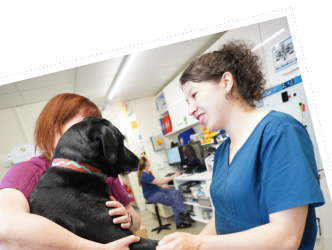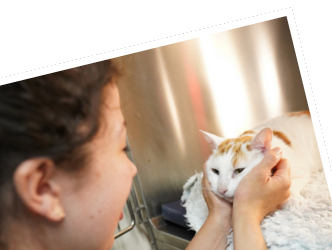
Dental care at home
Did you know that by the age of three, approximately one third of pets will have periodontal disease?
Dental disease can be painful. At Daventry Vets we offer your pet all the dentistry services they might ever need. Yet, we are passionate about educating owners about their pet’s oral health.
There are many small changes you can implement into your pet’s day-to-day management that will keep their mouth in top condition.
Book a dental check-up for my pet
What can I do at home to look after my pet’s teeth?
Incorporating brushing your pet’s teeth into their daily care routine will help keep dental disease at bay. Brushing is the very best dental healthcare you can do for your pet. It’s all about getting into a routine and brushing daily.
How do I brush my pet’s teeth?
Using pet safe toothpaste is essential as some of the chemicals in human toothpaste can be toxic, as human toothpaste is not designed to be swallowed. First find a toothpaste they like the taste of. Get them used having your finger rubbed over their teeth before you start to introduce a toothbrush. When you and your pet are ready move onto a brush. You may want to start with a finger brush as this is softer, then move onto a brush as this will break down the plaque better.
It may take a few attempts to get your pet comfortable with the idea of having their teeth brushed so persevere.
Here are some links to videos from International Cat Care and the PDSA on how to brush your pets teeth with lots of tips.
Our nurses are more than happy to demonstrate how to effectively brush your pet’s teeth so contact us to book onto a nurse clinic.
Contact us book a Nurse Clinic
What about food, dental chews, bones and water additives?
We are all pushed for time and there’s a constant stream of new products saying we don’t need to brush. Do they work? Do I need to brush my pet’s teeth?
-
- Yes. If your pet will let you brushing their teeth is the best way to help prevent dental disease.
-
- These products do help. The Veterinary Oral Health Council Seal is only given to products that have shown they work. We recommend products that reduce both plaque and tartar – take a look at the links below:
-
- Whilst dogs that chew on bones may appear to have cleaner teeth with less tartar studies have shown that they still have the same amount of periodontal disease which is what can lead to tooth loss. They also suffer from more tooth fractures which will require extracting or a root canal. We do not recommend them for dental care. Remember Antlers are also bones.
Our nurses will happily discuss your pet’s diet. Contact us today and read more on our dedicated Food & Nutrition. Read more about Daventry Vets’ dentistry services and facilities.
Contact our team and book your pet’s next dental check-up.
Contact us



